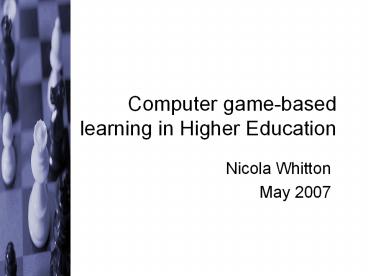Computer game-based learning in Higher Education - PowerPoint PPT Presentation
1 / 28
Title:
Computer game-based learning in Higher Education
Description:
Title: Games-based learning: what is the potential? Author: User Last modified by: Nicola Whitton Created Date: 5/24/2006 9:36:12 AM Document presentation format – PowerPoint PPT presentation
Number of Views:120
Avg rating:3.0/5.0
Title: Computer game-based learning in Higher Education
1
Computer game-based learning in Higher Education
- Nicola Whitton
- May 2007
2
Background
3
Can computer games be used to support learning in
HE?
- Is there a rationale for using computer
game-based learning in Higher Education? - How best can computer games be designed to be
usable and enhance learning? - How can the educational effectiveness of computer
game-based learning be measured? - How do differences in game design effect the
learning experience?
4
Overview of activities
5
Key influences
- Constructivism (Bruner, Jonassen)
- Experiential learning (Kolb)
- Problem-based learning (Boud, Barrows)
- Collaborative learning (Vygotsky, Wenger)
- Adult learning (Knowles)
- Games-based learning (Prensky, Gee)
- Multimedia learning (Mayer)
- Engagement (Malone, Csikszentmihalyi)
6
Q1 Why use games in HE?
- Rationales in literature
- Motivation
- Stealth learning
- However games can be constructivist learning
environments - Students in HE motivated to use games to learn if
seen as most effective way
7
Research activities
- Interviews (12)
- What is a game?
- Motivations to play games?
- Acceptability of game-based learning?
- Survey (200)
- What types of game do people play?
- What are their motivations?
- Are educational games intrinsically motivating
for students in HE?
8
What is a game?
- Challenge
- Competition
- Fantasy
- Goals
- Immersion
- Fun?
- Interaction
- Outcomes
- People
- Rules
- Safety
9
Why do people play games?
- Cerebral
- Social
- Physical
- Boredom
- Social facilitation
10
Some results
Computer Non-computer
Social (52) Social (52)
Cerebral (52) Cerebral (34)
Boredom (48) Boredom (30)
Physical (6) Physical (27)
Social facil. (6) Social facil. (12)
11
Factors influencing motivation
- Motivators
- Swift and steady improvement
- Perception of being good
- Demotivators
- Difficulty getting started
- Getting stuck
- Lack of trust with the game
- Intrinsic uninterest in the subject
12
Motivation
- Are you motivated or demotivated by game-based
learning?
Demotivated 9
Neither 28
Motivated 63
13
Q2 What is best practice?
- Evaluation of existing guidelines
- Constructivist learning environments
- Educational multimedia
- Designing for engagement
- Analysis of existing games
- Potential educational value
- Evaluation of interface design
14
Criteria (1)
- Game design for learning
- Supports active learning
- Engenders engagement
- Appropriateness
- Supports reflection
- Provides equitable experience
- Provides ongoing support
15
Criteria (2)
- Interface design
- Flexible interaction
- Support for player community
- Transparent navigation
- User control
- Robustness
- Appropriate visual design
16
Effective games for learning
- Games that involve
- Problem solving
- Exploration
- Collaboration
- Authentic activities
- For example
- Adventure
- Role play
- Simulation
17
Game-based learning design
- Activity to teach basic group skills
- Two games designed with identical
- learning outcomes
- support materials
- debriefing
18
The Time Capsule
- Based on existing classroom activity
Challenge ? Interaction ?
Competition ? Outcomes ?
Fantasy ? People ?
Goals ? Rules ?
Immersion ? Safety ?
19
The Time Capsule
20
Pharaohs Tomb
- Developed from scratch
Challenge ? Interaction ?
Competition ? Outcomes ?
Fantasy ? People ?
Goals ? Rules ?
Immersion ? Safety ?
21
The Pharaohs Tomb
22
Development
- Iterative prototyping
- Game play evaluation (observation)
- Group interface evaluation (think-aloud /
observation) - Individual interface evaluation (Wizard-of-Oz,
think-aloud)
23
3. How can educational effectiveness measured?
- Learning
- Pre-test/post-test not applicable
- Self-perception of learning questionnaire
- Engagement
- Post-experience questionnaire
- 42 question scale tested
- Reduced to 18 questions
24
Engagement factors
- Challenge
- Motivation
- Clarity
- Achievability
- Control
- Immersion
- Interest
- Purpose
25
4. Comparing game-based learning
- Comparative experiment
- Time Capsule groups
- Pharaohs Tomb groups
- Examining differences
- Learning
- Engagement
26
Experiments
- Edinburgh computing students
- 8 Pharaohs tomb
- 9 Time capsule
- Hong Kong marketing students
- 12 Pharaohs tomb
- 7 Time capsule
- Edinburgh computing students
- 43 Pharaohs Tomb
- 36 Time Capsule
27
Results
- Learning
- No significant difference
- But questionable reliability
- Engagement
- No significant difference overall
- Significant difference in control
- Difference in immersion
28
Conclusions
- Games can be collaborative, authentic, active and
experiential learning environments. - To be effective games must be designed with
learning in mind and seen as the best way to
learn by students. - Games do not have to have every game
characteristic to be engaging. - How does novelty fit in?































